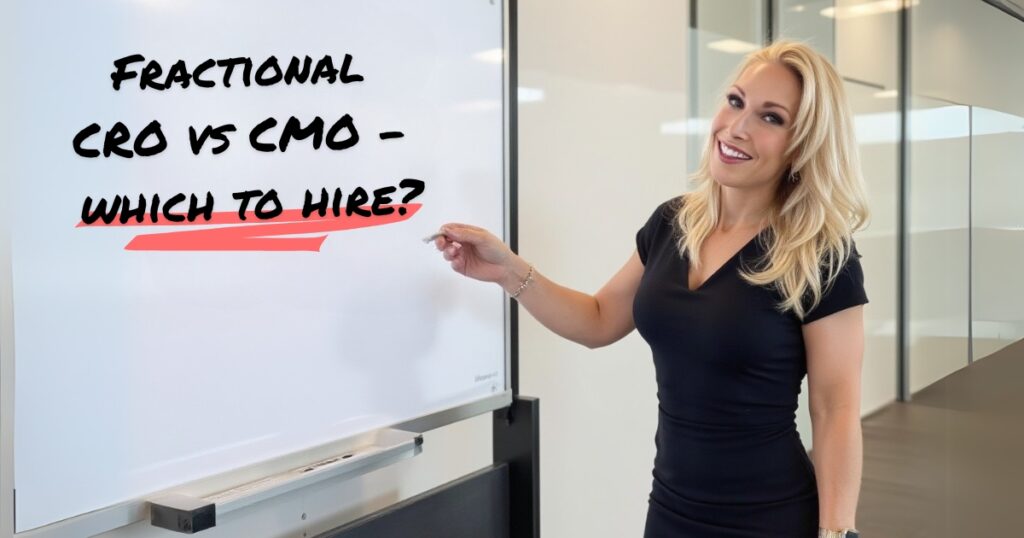
Frustrated by stalled growth? You’re not alone. It’s inevitable, and every founder will confront this reality at some point in their company’s life cycle. Rapid expansion inevitably meets obstacles—market saturation, resource constraints, or competitive pressure. These unexpected plateaus typically emerge during scaling when effective strategies suddenly lose momentum.
The exhilaration of early traction transforms into frustrating stagnation as metrics flatten despite increased effort. This universal entrepreneurial experience isn’t failure – it’s an opportunity. Recognizing these natural boundaries enables sustainable business models through strategic pivoting, market expansion, or product diversification.
But how? You’ve built something valuable, but scaling revenue requires specialized expertise you might not have in-house. The solution often lies in executive talent, but full-time C-suite hires come with significant costs and commitments that early-stage companies simply can’t justify.
Enter the world of fractional executives. These experienced leaders work with multiple companies simultaneously, bringing enterprise-level expertise to growing businesses at a fraction of the cost. Two roles frequently considered are the fractional Chief Revenue Officer (CRO) and the fractional Chief Marketing Officer (CMO).
But which one does your company actually need right now?
> Core Differences Between Fractional CRO and CMO
Before making this decision, you need clarity on what each role actually delivers. The differences are substantial and directly impact your growth trajectory.
A fractional CRO focuses on the entire revenue generation machine. They oversee sales processes, customer success, partnerships, and revenue operations. Their primary metrics include pipeline growth, conversion rates, deal velocity, and ultimately, revenue attainment. CROs think in terms of predictable revenue systems and sales execution.
A fractional CMO, meanwhile, concentrates on market positioning, brand development, demand generation, and marketing operations. They measure success through metrics like brand awareness, lead generation, customer acquisition costs, and marketing-attributed pipeline. CMOs think in terms of market perception, customer journeys, and building sustainable demand.
The fundamental question isn’t which role is better. It’s which function represents your current bottleneck to growth.
> When to Hire a Fractional Chief Revenue Officer (CRO)
Consider bringing on a fractional CRO when your company faces these specific challenges:
1. Your sales process lacks structure and repeatability.
If deals seem random or your sales cycle is inconsistent, a CRO can implement methodologies that create predictability.
2. Revenue is growing but inefficiently.
When customer acquisition costs are high, or sales productivity is low, a CRO can optimize your revenue operations.
3. You have market interest but struggle with conversion.
If leads exist but don’t convert effectively, a CRO can rebuild your sales approach and improve close rates.
4. Your go-to-market strategy needs refinement.
When you’re uncertain about pricing, sales channels, or partnership structures, a CRO brings strategic clarity.
5. You need to build or restructure a sales team.
A CRO can define roles, create compensation plans, and establish performance metrics that drive results.
One founder described their experience as follows: “We had plenty of inbound interest but couldn’t seem to close deals efficiently. Our fractional CRO rebuilt our entire sales process in three months, and our close rate improved by 40%.”
> When to Hire a Fractional Chief Marketing Officer (CMO)
A fractional CMO becomes your priority when facing these challenges:
1. Your market positioning lacks clarity.
If prospects don’t understand your value proposition immediately, a CMO can sharpen your messaging and positioning.
2. Lead generation is inconsistent or insufficient.
When your pipeline is too small to support growth goals, a CMO can build sustainable demand generation programs.
3. Your brand doesn’t stand out in the market.
If competitors win mindshare with your prospects, a CMO can develop differentiation strategies to help you break through the noise.
4. Marketing efforts feel scattered and unmeasured.
A CMO brings strategic focus and implements proper attribution to understand what’s working.
5. You need to build a marketing foundation.
When you lack the basic infrastructure for effective marketing, a CMO can establish the necessary systems and processes.
“We were doing random marketing activities without a coherent strategy,” another founder shared. “Our fractional CMO helped us focus on the channels that actually mattered for our audience and built programs that consistently delivered qualified leads.”
> Use This Decision Framework to Choose CRO vs CMO
Questions to Help Decide Which Role to Hire
To determine whether a Fractional CRO or CMO is the right fit for your business, ask yourself:
- What is my immediate priority?
- If it’s revenue growth and optimizing sales processes: Fractional CRO.
- If it’s improving brand awareness or customer acquisition: Fractional CMO.
- Where are my biggest bottlenecks?
- Are they in the sales pipeline or deal closures? → CRO
- Are they in generating leads or building brand recognition? → CMO
- Do I need alignment across departments?
- If yes (sales, marketing, customer success): CRO.
- If no (focused solely on marketing): CMO.
- What’s my budget?
- Both roles are cost-effective alternatives to full-time hires but assess which area (sales vs. marketing) will provide faster ROI.
- What stage is my company in?
- Scaling rapidly or entering new markets: CRO.
- Refining brand identity or launching campaigns: CMO.
- Do I have an existing team for execution?
- A CRO often optimizes existing teams across departments.
- A CMO may require hiring or managing a marketing team.
- Am I looking for short-term fixes or long-term strategy?
- Both roles can offer short-term expertise, but a CRO often focuses on immediate revenue impact while a CMO may focus on long-term brand equity.
> Or Take a Hybrid Approach
Some founders find themselves needing both functions but can’t afford two fractional executives simultaneously. In these cases, consider:
Sequential hiring. Bring in a CMO to establish market positioning and lead generation, then transition to a CRO to optimize conversion once the pipeline is flowing.
Part-time for both. Some fractional executives work fewer hours, allowing you to potentially engage both a CRO and CMO at reduced time commitments.
Revenue-focused CMO or marketing-savvy CRO. Some executives have hybrid backgrounds spanning both functions. While rare, these individuals can bridge both worlds temporarily.
> Making the Most of Fractional Leadership
Regardless of which role you choose, maximize the relationship with these approaches:
Set clear objectives and key results. Define what success looks like within the first 30, 60, and 90 days.
Integrate them with your team. Fractional executives work best when they have direct access to relevant team members and aren’t isolated.
Be transparent about challenges. Share the good, bad, and ugly about your current situation so they can address the real issues.
Focus on knowledge transfer. The best fractional relationships build capabilities within your existing team.
The decision between a fractional CRO and CMO ultimately comes down to understanding your specific growth bottlenecks. Both roles bring tremendous value when aligned with your actual needs. The right choice accelerates your growth while building sustainable revenue systems that scale with your business.
By carefully assessing your current challenges and growth objectives, you’ll make a strategic investment that delivers the expertise you need without the overhead of a full-time executive hire. And that’s exactly what fractional leadership should provide: the right expertise at the right time to unlock your next phase of growth.






